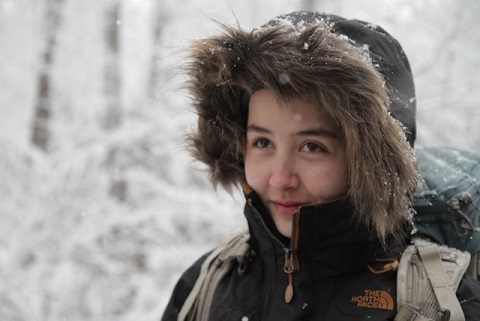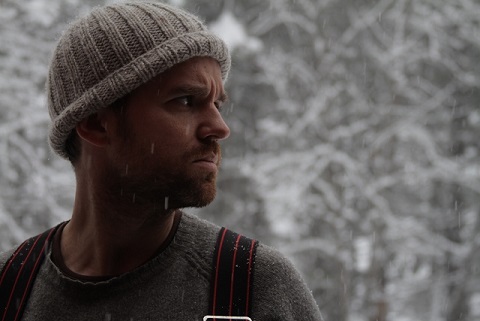New Visions award winning Sci-fi film Astraea had actors and crew working in harsh conditions on a limited budget. Twitter: @astraeathemovie
Call these actors crazy or call them troopers - either way, their bravery in treading through harsh weather and barely any internet or cell phone access is what helped make Astraea come to life.
What was going through your mind when you accepted this role? Did you audition?
After the audition, I didn't allow myself to think anything at all as a safety mechanism because I was sure I would not get the part. Then when I did get the part, I had a scarier thought: what if I can't act this? What if I'm not good enough? I called my father and he said "Stop it. Go get them." And soon after, I was on a flight to Maine.
Why did you become an actor and why did you choose NYC to go to acting conservatory?
Good storytellers and magicians are very fascinating to be with and watch. This made me want to be in entertainment. Because my father is a pilot, traveling is encouraged. Once I got into an acting conservatory I dedicated my attention to listening to people. Out of all the information I received, I was hooked on films and their respective magic. Watching behind the scenes is almost as good as watching the film. It's a clear thing when you point at the screen and say 'I want to be there' because acting in film is being a storyteller and a magician.
Was there any point during the filming of Astraea that you said to yourself, "I can't believe I'm doing this?"
We spent two hours filming Astraea angrily chopping wood. I had never chopped wood before (I had also never held an axe before) but the character of Astraea already knew how to use an axe. It took me the majority of that hour to get the strength to chop that wood. And then I had lines. The crew helped me out by pre-chopping the wood and letting me swing at it. It felt exhilarating; I thought my hands were going to fall off. Unfortunately, that scene isn't in the film.
How long was filming? Did you get to go home on weekends or at any point before filming finished?
The filming took four and a half weeks. Our days off were Thursdays. To keep my grades up I had to fly back to NYC on Wednesday night. Go to class on Thursday from 9am-4pm with scenes to present and take a flight back to Maine at night, arriving in time to sleep and get up at 6am to film the next day. Coming back to Maine was always the thing I looked forward to the most.
What was the hardest part of working on this film?
The hardest element to this film was running through the snow in full gear. I hadn't warmed up properly and when 'action' was called, I ran for my life. I only lasted two takes but it was so freeing to run through the woods with every ounce of your energy. I then saw the footage and realized that I was much faster in my head than in real life.
Anything else you'd like to say?
The day before filming began, when everyone was getting to know each other, the director Kris asked us actors to take a walk with him. The sun had set and we walked across a frozen lake to a small island covered in trees. We came to a fallen tree trunk in the middle of the island and he asked us to sit down and close our eyes. He then asked us 'What do you hear?' I heard the traffic from miles away and the tree branch under my feet cracking at the same time. When you use what is around you to put yourself into the world of the film, the 'living' gets much easier.
You're an L.A. Actor. When working on the East Coast, where do you stay?
When I work on the East Coast, I am fortunate to have a number of safe houses that will harbor me. My brother puts me up in New York and my parents in Virginia. I stayed there while shooting a film in DC a few years ago, much to my mother's delight. Depending upon the production and their budget, I've stayed anywhere from the Four Seasons to friends' couches.
Astraea was an exceptionally cool housing situation. The director, Kristjan Thor, a good friend and amazing artist, asked me to stay in the house where we were filming for the month of the shoot. It was a unique opportunity for total immersion into the world we were creating. It was an old Maine farmhouse, full of generations of books, furniture, snow shoes, old wallpaper, knick knacks, etc. that really informed my character and performance.
You're used to working on big budget productions. What were the differences between working on Astraea vs. NBC's Whitney and How I Met Your Mother?
Working on Astraea differed from a network sitcom gig because there was hardly any budget at all; it was a passionate group of friends determined to make something as beautiful as possible. That energy and enthusiasm was invigorating and inspiring to be around. I left LA where it was warm and sunny, got to Maine, and the first day I was gutting fish in a blizzard, chopping wood, and doing ice fishing scenes on a frozen lake.
If you had to do anything remotely dangerous, like touch an animal, on the set of "Whitney", NBC sent an army of people to make sure you were okay. In Maine, the director was offering to trade boots with me if my feet were too frozen to keep doing the scene. A sitcom is a well-oiled 9-5 machine, and on Astraea, the crew decided to stay up all night once to shoot the sunrise on a whim. A sitcom works at a breakneck pace putting out 22 episodes in a few months and the lines and jokes change almost daily. Working on an indie feature like Astraea gave me much more time and freedom as an actor to explore, make discoveries, take chances, and in general work at a deeper level than you get to on a big budget sitcom.
Did you create a backstory in your head for your character in Astraea?
I like to use my own experiences as jumping off points for backstory. For example, the character of James was a teacher, and I used to teach kids at the Neighborhood Playhouse in NY. I borrowed those real memories and placed them in the imaginary circumstances of the film, i.e. children dying in class. Kind of gruesome, but that was the reality for the character. I spent a lot of time doing sense-memory work on what it was like to see everyone in the the world "drop dead." Real fun stuff. Ashlin Halfnight wrote an amazing screenplay. There was so much for me as an actor to sink my teeth into: the complicated relationship between James and Callie as cousins who are the last man and woman on earth, James' father euthanizing himself, reintegrating into civility with other people after a global pandemic. It was an actor's dream come true. Having a great director like Kris helped too. He sent the cast an email before the shoot titled, "Awesome Actor Stuff," with homework like, "please describe the apocalypse you just lived through in 1) a paragraph 2) a sentence 3) three words 4) one word" I get really into process-y stuff like this. I'm a downtown experimental theater artist at heart.
Anything else you'd like to say?
If doing Astraea taught me anything, it's that you can do it. Whatever it is you think you are supposed to do, whatever that voice in your head is saying you should do, you can do it. Take the first step and be amazed at how many people will come along and help you.


